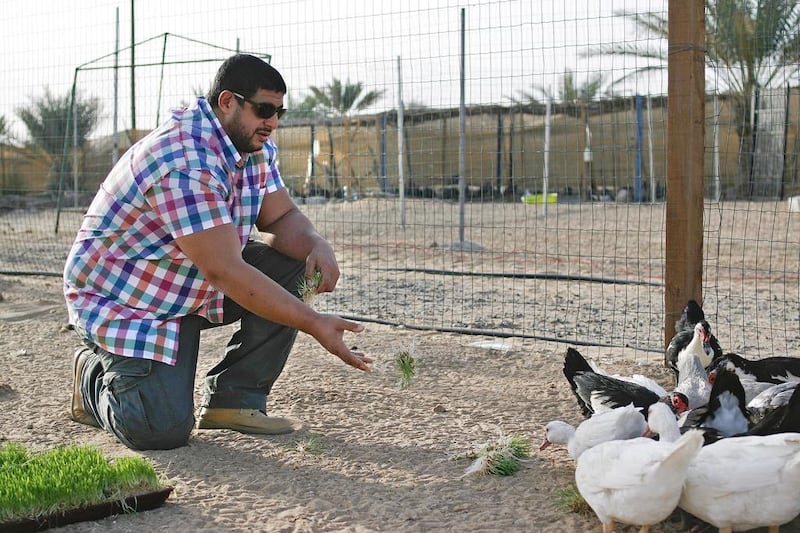It was through his role protecting the lives of top VIPs that Mohammed Salama first developed a curiosity for organic food.
By day, Mr Salama works in the security field for Abu Dhabi’s ruling family. But after hours, he puts on his jeans and gets stuck in at his new farm – the first organic meat farm to operate in the UAE.
Mr Salama, 37, was born in Sharjah and completed a bachelor’s in business in the US in 2001.
"Since then I have worked in the security field non-stop," he says. "Through this journey, I came to a very important aspect of security – food security."
In 2007, Mr Salama took a course in the UK on chemical, biological, radiological and nuclear security for VIPs. “We wanted to be sure our food didn’t suffer from bad radiation, and to find out more about diseases like bird flu. I also learnt about chemicals added to make food live longer,” he says.
He said he told his boss that “even the most expensive food still has harmful chemicals in it. For food to travel from one country to another, it must contain some chemicals, and some plants have also been genetically modified [GMO].” He continued that he “started thinking of ways to avoid these things.”
The solution? To raise animals and grow vegetables organically under Mr Salama’s supervision on the Royal Farms.
It took two generations to rid the meat of chemicals, hormones, steroids and antibiotics with natural alternatives used instead.
“By that time the shape, taste and colour of the meat was different. The reaction of people now when they see our chicken meat is: ‘This is not a chicken.’”
Mr Salama then asked for permission to launch his own organic farm: “They said, ‘Go ahead – we support you.’” It is called Yas Farm – after its founder’s four month-old daughter Yas.
Six months ago Mr Salama sold the first organic meat to be bred in the UAE for public consumption. He now sells eight kinds of organic vegetables, along with eggs, raw goat and camel milk and free range chicken, duck, pigeon, rabbit, turkey, geese and quail.
A member of the Royal Family is a business partner, along with a Briton, Tareq Shaheen, 30, a chief operating officer for an Abu Dhabi-based investment group.
In the early days of the venture, life was hectic. For example, while one person was working on the farm, another was frantically jumping in and out of the lorry to make deliveries at dawn to hotel restaurants. Mr Shaheen explains: “There wasn’t a day when one of us didn’t tell the other ‘I’m quitting’. Consumers were spread around the country, products would expire if they were in transit too long, and chefs wanted extraordinary quality extraordinarily quickly. We were together so much that arguments erupted frequently. We had no choice but to solve them immediately.”
As chefs learnt about the farm’s new products, the company rapidly expanded. Yas Farm now partners with a French organic livestock company supplying up to 700 organic ducks and chickens across the GCC per month.
The business is one of several organic farms to open in the UAE recently – the number rose to 39 in 2013 covering a total of 3,920 hectares, compared with just 218 hectares in 2007. A report by Frost and Sullivan says organic farming in the GCC is set to reach US$1.5 billion by 2018. Saud Salim Al Mazrouei, director of Hamriyah Free Zone Authority and Sharjah Airport International Free Zone, who recently led a delegation to London for the Natural & Organic Products Europe exhibition, said: “The gradual shift for organic food and products in the Middle East and the current position of UAE as the second-largest market for organic food in the region has made this sector integral to us.”
Despite industry growth, Yas Farm remains the only specialist in organic meat.
Chickens are sold for between Dh40 and Dh75, but most of that covers the farm’s overheads. “It’s not cheap. In the summer the birds need AC and in the winter heaters,” says Mr Salama.
Orders are made via Facebook (The Yas Farm) and delivered to customers’ homes. The Dh20 delivery charge is waived for those living in a housing community (such as Al Raha Beach).
Their five-year plan is to open a retail shop, organic restaurant and farm cafe. “This isn’t about making money – I have my job and I’m financially stable. We feel part of a group of people who are changing the food world,” Mr Salama says.
business@thenational.ae
Follow The National's Business section on Twitter





